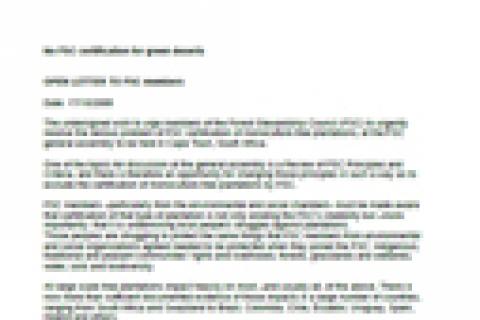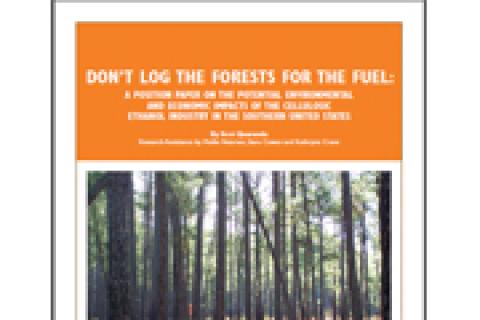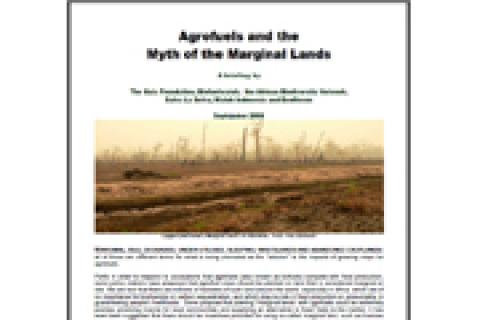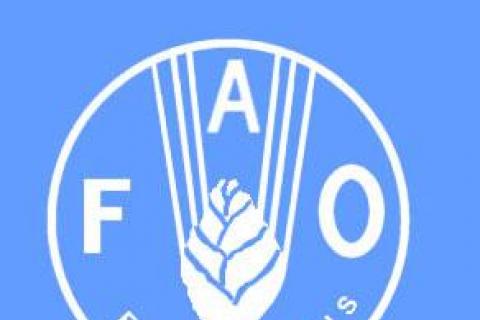From Green Ideals to REDD money. A brief history of schemes to save forests for their carbon.
November 2008, 6 pages. A short overview of latest developments with some basic conclusions and recommendations
An overview of selected REDD proposals.
Other information
In defence of Human Rights, Food Sovereignty, Biodiversity and Climate Justice
Ironically, on 16 October 2008, World Food and Food Sovereignty Day, a meeting will start in Cartagena (Colombia) to promote monoculture oil palm plantations, that are precisely the cause of so many violations of the Right to Food and contrary to food sovereignty insofar as they undermine the peoples’ right to produce their own food according to their territorial conditions and their food culture.
Agrofuels have been presented as the solution to the climate crisis and as a "clean" alternative to fossil fuels. But in reality they are neither "green" nor environmentally friendly, no matter how international financial institutions (such as the World Bank and the Inter-American Development Bank, among others) and transnational corporations would like to promote them.
The US-based Newmont Mining Corporation, one of the world's largest producers of gold, has plans to place an open pit gold mine in the Ajenjua Bepo Forest Reserve in the Birim North District in the Eastern region of Ghana.
The organization No Dirty Gold informs that the projected mine would occupy an area 1.65 miles long (2.6 km) and a half mile across (0.8 km), and would create waste piles 60-100 m high. The mine would destroy an estimated 183 acres (74 ha) of forest in the reserve.
In yet another incident, the tribal and dalit women of village Harna Kachar, Sonbhadra district of Uttar Pradesh, had to bear the brunt of atrocities by the Police and the Forest Department.
The organization Maderas del Pueblo del Sureste, A.C. reported in a recently issued communiqué that on 3 October, a brutal police operation took place, violating the most basic human, individual and collective rights, involving the federal and state police, against the indigenous and peasant Tojolabal inhabitants of the Miguel Hidalgo community, Municipality of Trinitaria, Chaipas. Since 7 September, this community had been managing the Maya archaeological and ceremonial site of Chinkultic.
A Position Paper on the Potential Environmental and Economic Impacts of the Cellulosic Ethanol Industry in the Southern United States.
By Scot Quaranda Research Assistance by Mollie Petersen, Siara Cowan and Kathryne Crane
Download full report as pdf
A briefing by The Gaia Foundation, Biofuelwatch, the African Biodiversity Network, Salva La Selva, Watch Indonesia and EcoNexus, September 2008
Download as pdf
Planting trees is generally considered to be a positive action. The act of planting a tree – either at a school or in a peasant community – in many societies symbolizes concern for nature and a contribution by the present generation to future ones.
Press Release -
Rome, 22 September 2008. Representing the World Rainforest Movement, Raquel Núñez met today in Rome with FAO forestry officials to raise the issue of the problems resulting from the definition of forests by that UN agency that includes all types of plantations as “forests.”
By Bakari Nyari, Vice Chairman of Regional Advisory and Information Network Systems (RAINS), Ghana and African Biodiversity Network Steering Committee member
This is the story of how a Norwegian biofuel company took advantage of Africa’s traditional system of communal land ownership and current climate and economic pressure to claim and deforest large tracts of land in Kusawgu, Northern Ghana with the intention of creating “the largest jatropha plantation in the world”.
Simple lessons are not necessarily easy to learn.
For example: oil is a non-renewable and limited resource (1)
Oil and conflicts appear to be twins in today’s world. When people think of oil, in general terms, what come to mind are ‘progress and development’. Thus, people speak of oiling the wheel of progress. Today, however, what we see and experience is that oil greases the wheels of conflict. And this is very much the case in the oil fields of Africa.





